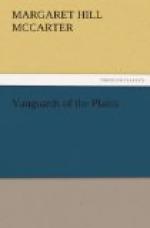And yet of all the heroes whose life-trails cut my own, I account among the greatest those men under whose command, and with whose comradeship, I went out to serve the needs of my generation among the vanguards of the plains. And if in a sunset hour on the west ridge beyond the little town of Burlingame I had left a hopeless love behind me, I put a man’s best energy into the thing before me.
The battle-field alone is not the soldier’s greatest test. I had kept step with men who charge an enemy on an open plain or storm a high defense in the face of sure defeat. I had been ordered with my company to take redoubts against the flaming throats of bellowing cannon in the life-and-death grip before Richmond. I had felt the awful thrill of carnage as my division surged back and forth across the blood-soaked lengths of Gettysburg, and I never once fell behind my comrades. The battle-field breeds courage, and self-forgetfulness, and exaltation, from the sense of duty squarely met.
There were no battle-fields in 1867, where Greek met Greek in splendid gallantry, out on the Kansas plains. Over Fort Harker hung the pall of death, and in the July heat the great black plague of Asiatic cholera stalked abroad and scourged the land. Men were dying like rats, lacking everything that helps to drive death back. The volunteer who had offered himself to save the settlers from the scalping-knife had come here only to look into an open grave, and then, in agony, to drop into it. Such things test soldiers more than battle-fields. And our men turned back in fear, preferring the deserter’s shame to quick, inglorious martyrdom by Asiatic cholera. I had a battle of my own the first night at Fort Harker. There was a growing moon and the night breeze was cool after the heat of the day. Beverly Clarenden and I went down to the river, whose tawny waters hardly hid the tawny sands beneath them. The plains were silent, but from all the hospital tents about the fort came the sharp, agonized cries of pain that forerun




